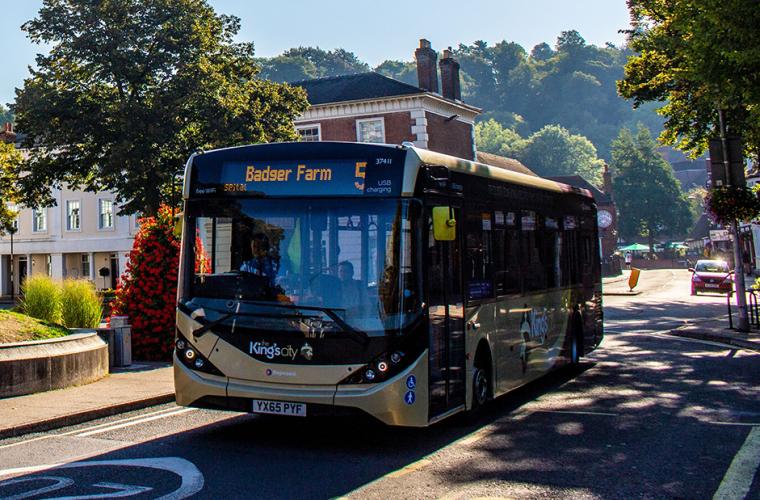An alarming number of cherished bus routes could be lost forever from April without further Government funding support and a long-term plan to keep them running, councils and transport groups are warning today.

Operators face a double whammy when the Bus Recovery Grant, used to support certain routes when the pandemic saw passenger numbers plunge, finishes at the end of March, along with the end of the Government’s temporary £2 fare scheme.
Even with extra support from the Government, over a thousand routes were lost last year. Without further support, the Local Government Association, which represents councils, is warning that thousands more routes could have to be axed, putting the Government’s own National Bus Strategy at risk of failure.
It is joining with the Urban Transport Group and Association of Directors of Environment, Economy, Planning and Transport (ADEPT) to also call for a long-term funding plan from Government on how to continue to protect routes.
It comes as new LGA analysis has found that subsidies for rail passengers have rapidly outpaced subsidies for bus passengers. The Department for Transport (DfT) now spends more than £4.50 on subsidising rail passenger services for every £1 it spends on bus subsidies. This is three times the amount the DfT subsidised the rail industry before the pandemic.
On average, there has been around a 15 per cent fall in bus passengers since the pandemic. Although in some cases this is a relatively small fall in numbers, it leaves operators and councils needing additional support to make lifeline routes commercially viable to run. This could lead to services being withdrawn to the detriment of the remaining 85 per cent of people who do continue to depend on these routes.
Buses play a vital role across the country and are hugely important if we are to make our air cleaner and meet net zero ambitions. They enable people to shop, visit friends and family, get to work and access vital services, and for many people are a lifeline as they face the current cost of living crisis. Councils are warning that any reduction could result in communities being cut off, pensioners missing hospital appointments and fewer shoppers on our high streets.
At the same time, councils are reporting an estimated 20 per cent increase in the cost of providing commercially unviable bus services than a year ago. This is due to increased fuel costs as well as the pressure caused by bus driver shortages.
The LGA is calling for Government to prioritise long term support for buses so operators and councils can deliver bus services to help people get to work, shops, leisure or access public services. It said a multi-year, long term funding stream of support for at risk routes would allow time for ridership and fares income to grow and subsidies to fall.
Cllr David Renard, Transport spokesperson for the LGA said:
“The future of thousands of bus routes is at risk. Passenger numbers have not returned to those seen before the pandemic and without continued support, it is clear that some routes will no longer be viable and will have to be reduced.
“This will have a devastating impact on people who rely on these services to get to work, visit family and access vital services, including doctors and affordable food shopping.
“To avoid recurring funding emergencies and achieve the enormous social, economic, health and environmental benefits of a regular and affordable bus service in every part of the country, the Government should give local authorities long term funding so they not only keep services on the road but improve them for the people who use them too.”
Jonathan Bray, Director of the Urban Transport Group, said:
“The Government has, rightly, backed the bus in London through a funding deal for Transport for London. We urgently need Government to do the same in the rest of the country otherwise we face the prospect of further devastating bus cuts which will leave more people and places poorly served, or with no public transport whatsoever. It would also make a mockery of the Government’s £2 fare scheme – designed to boost bus travel and help tackle the cost-of-living crisis – if the very services the scheme was designed to promote were then scrapped.
“With every day that passes without a decision on bus funding for the next financial year, we risk more cuts being hardwired into bus operators’ plans given planning horizons for new timetables. It’s now time to turn the fine words of the national bus strategy into a firm commitment to continue to back the bus in the year ahead.”
Mark Kemp, President of ADEPT said:
“Bus services are a vital ingredient in our response to the challenges presented by the Decarbonisation of Transport Strategy, Bus Back Better and the Bus Service Improvement Plan. Funding has supported that agenda, but patronage has not yet returned to pre-pandemic levels – Government needs to continue to support the industry as it recovers and adapts. A long-term funding strategy is vital in enabling the Enhanced Bus Quality Partnerships to deliver public transport for their area.”
Notes to editors
- The £130 million Bus Recovery Grant was extended in September and is due to finish at the end of March.
- Full details of subsidies available for the bus and rail industries can be found in the Department for Transport accounts.
- Latest bus patronage figures, excluding London, are published monthly by the Department for Transport.
- Local Transport Commissioners found that one in ten bus services had been deregistered between January 2022 and January 2023.
